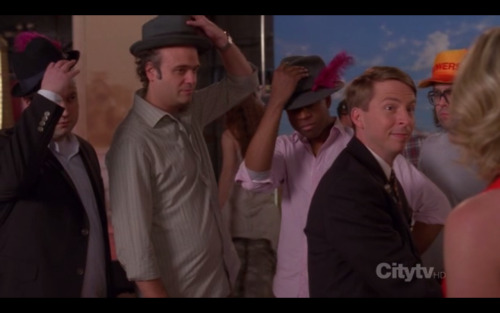 This morning while going through Tweets to see what good articles could help me through the morning, I saw this one, posted by both Joe Ginese and Lisa Endersby, two great educators in the field who tweets and links I have come to enjoy greatly :)
This morning while going through Tweets to see what good articles could help me through the morning, I saw this one, posted by both Joe Ginese and Lisa Endersby, two great educators in the field who tweets and links I have come to enjoy greatly :)This one was about troublemaking. Not the sort of troublemaking that the Pranksmen of 30 Rock to your left are associated with, per se, but I'm sure you know the kind I mean. The dissenters. The ones who ask questions that others might tell you not to ask, the ones who question the status quo and bring up new ideas where they're not always welcome. For my part, the end of the year and times of officer transition bring this about considerably, so it's quite a timely concept here in the Student Activities Center.
The example given in the article is that of an engineer named Roger Boisjoly, who worked for NASA, who wrote a memo that sparked ire and frustration from his colleagues, calling attention to a problem that, at its worst, could cause the loss of human life. Angered by the potential change to the status quo, or "excessive worrying", his concerns were cast aside.
The loss of life he was referring to? The January 1986 Challenger explosion.
While many of the whistleblowing we may wish to do won't result in such a catastrophic end result (I certainly hope that's not the case during officer transition!), the case of Boisjoly should still teach us something.
What issues- in your work, in your office, in your life- are in need of some pot stirring? Even in far less extreme cases, if something feels wrong, there's probably a good reason for it. Ask questions. Challenge the way things are done if they don't feel right.
Some offices, or life circumstances, are more supportive of such paradigm shifts than others, but should a less supportive environment prevent you from speaking up? Not necessarily.
To those who supervise, are you fostering an environment in which people are comfortable asking those tough questions? If so, are you sure? For our latest student staff retreat, we realized in going over results that some students were uncomfortable asking us questions. And we never would have known, if we hadn't asked. And if you're not fostering an environment of curiosity, why not?
I'm far from an expert, but I've always been of the belief that you never know what you can change, if you don't start asking questions.
So throw on a fedora, and start causing some trouble :)
No comments:
Post a Comment